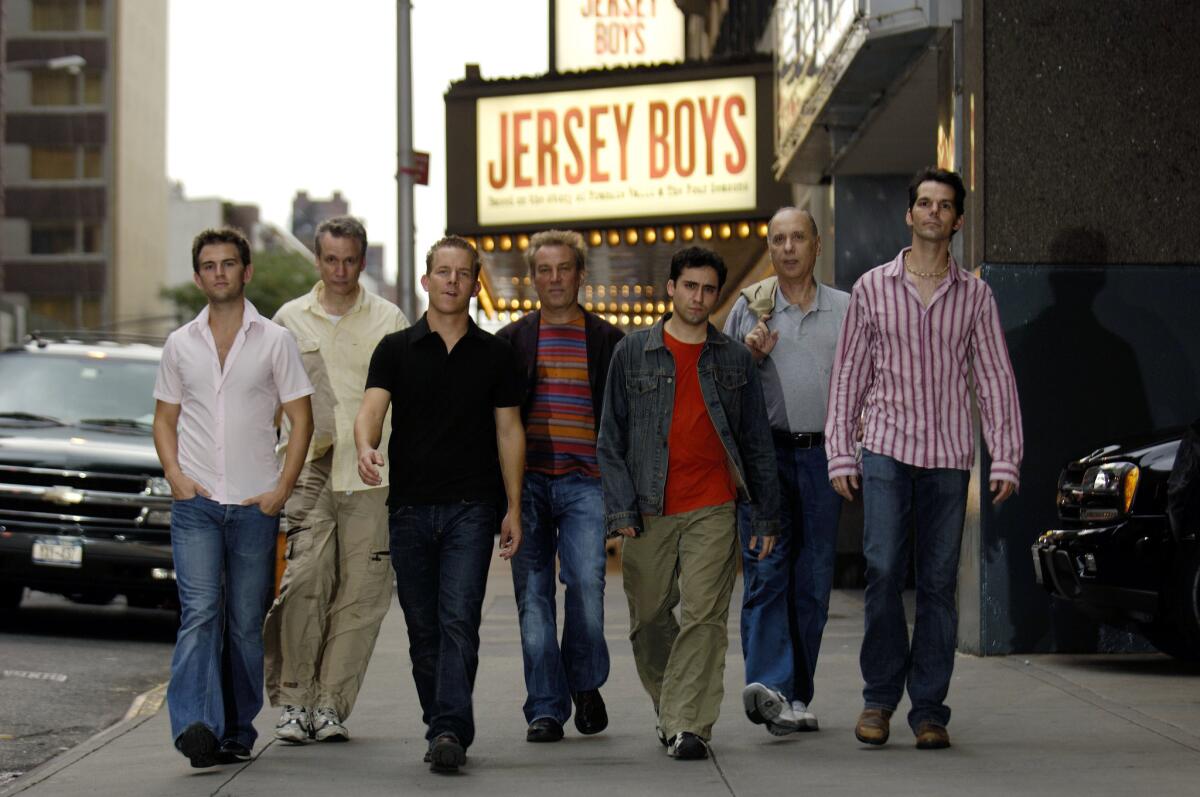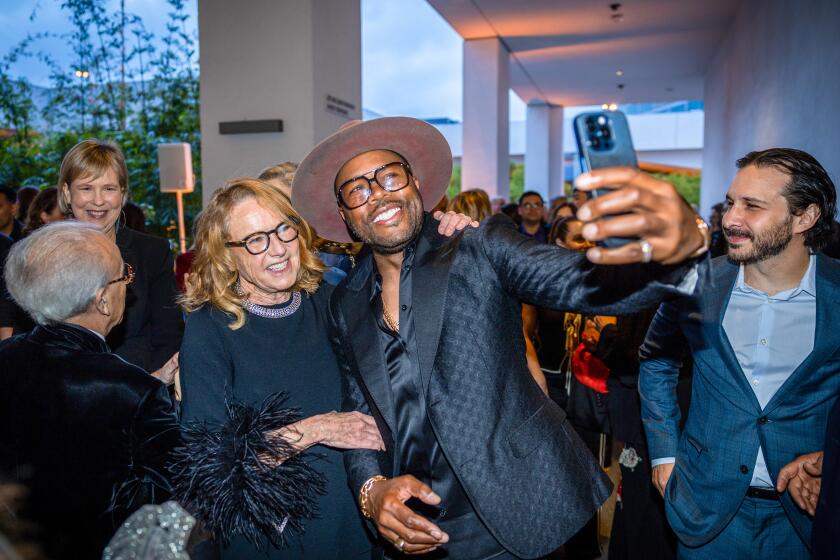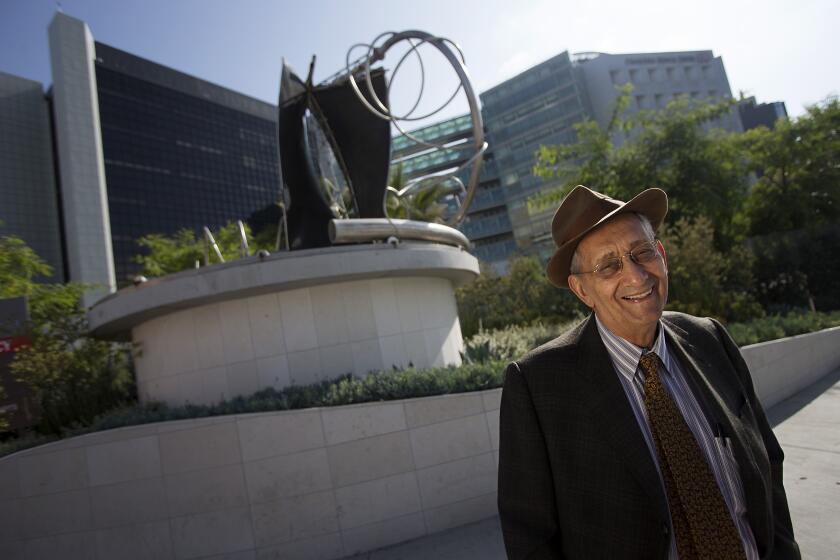‘Jersey Boys’ has been a windfall for all involved

At the height of their fame, Frankie Valli and the Four Seasons churned out a string of hit singles about a rag doll, a girl named Sherry and a particularly memorable night in late December, back in ’63.
The team behind the stage musical “Jersey Boys” has been singing a tune of its own during the last decade — a song of big money for its creators, investors and two members of the band that inspired it.
However successful Clint Eastwood’s movie version is at the box office, it will have a tough time catching up to the original jukebox musical, one of the few shows on Broadway that can call itself a billion-dollar business.
The appeal of the original “Jersey Boys,” first performed at the La Jolla Playhouse in 2004, can be explained in part by the classic pop-song soundtrack and a rags-to-showbiz-riches story. But its success can also be explained in numbers — very large numbers.
The musical — a modestly scaled story of four fresh-faced crooners from Newark who shot to fame during the ‘60s — has been running on Broadway for close to nine years. It recently passed 3,560 performances at the August Wilson Theater in New York.
In Las Vegas, the show is 6 years old and has run for more than 2,500 performances. A West End production in London has been running about as long.
“Jersey Boys” passed $1.7 billion in worldwide grosses in March, according to Michael David, a co-founder of the Dodgers, a Broadway partnership that is one of the show’s producers.
Much of that revenue has come from the Broadway production, whose ticket sales exceed $468 million. That’s a long way from catching Disney’s “The Lion King,” which is eight years older and is the first musical to cross the $1-billion mark on Broadway.
“Jersey Boys” has been seen by more than 20 million people in 10 countries, including Australia, South Korea and South Africa.
Like other shows of its age — nine years is old by Broadway standards — “Jersey Boys” is no longer the hottest ticket in town. Sales have declined since the height of its popularity in 2007 and 2008. But it is believed to be profitable most weeks, and there are no announced plans to end its New York run.
This year, the show has averaged $715,843 per week in Broadway grosses, down nearly 19% from the comparable period last year. The Dodgers said the show’s weekly running costs on Broadway are $400,000 to $500,000, below the average for a musical.
“Jersey Boys” demonstrates how a show well past its prime can still be lucrative for its key backers and creative team.
This certainly applies to the two original Four Seasons who were directly involved in the development of “Jersey Boys”: Valli, who turned 80 last month, and Bob Gaudio, 71. (The other two band members were Tommy DeVito and Nick Massi).
Valli and Gaudio negotiated royalty percentages and profit participation early in the game that have ensured them a steady stream of revenue, which legal documents show includes as much as 6% of the musical’s net profits.
In 2013, their take on the Broadway production alone was estimated to be at least $4.1 million. The figure is based on information in the documents as well as gross numbers and cost estimates provided by the Dodgers.
“Jersey Boys” cost $7.8 million to mount on Broadway when it opened in November 2005 and had recouped its investment by the following June, according to producers. The show received eight Tony nominations and won four, including the award for new musical.
When asked about the show’s long life, director Des McAnuff said “it would have been completely immodest of me to predict that when we opened. I wouldn’t have believed you, quite frankly.”
He attributed the musical’s legs partly to tight quality control: “There isn’t a single actor in ‘Jersey Boys’ anywhere that I haven’t approved or auditioned.”
The idea for “Jersey Boys” was conceived in New York in 2002 at a lunch meeting that turned into a nearly six-hour brainstorm.
Rick Elice, an advertising veteran with writing aspirations, had been in touch with a former client who had acquired an option on the Four Seasons’ catalog. (He declined to name the client.) A lunch was eventually arranged among Elice, writer Marshall Brickman, who was a friend of Elice, and Valli and Gaudio.
At the time, Brickman was best known for his screenplay collaborations with Woody Allen, including “Annie Hall.” He recalled that Valli and Gaudio were interested in creating a fictional stage drama using the catalog songs, in the mold of the ABBA musical “Mamma Mia!”
During the conversation, “They told us what it was like to grow up in Jersey,” Brickman said. “So I said, ‘Why don’t you let us do that?’” There was hesitation from Valli and Gaudio, as their early careers intersected with mobsters, he said. But they gave their blessing.
Elice and Brickman began shopping for backers. “Most everyone said no,” recalled Elice. At the time, they had no track record as Broadway writers.
They changed their pitch: “We stopped talking about the Four Seasons and we started talking data about record sales and demographics. In 2003, when we were searching around for a producer, the people who bought Four Seasons records were old enough to be in the largest part of the theater-going population.”
They soon landed a deal with the Dodgers, which has produced a number of shows, including the rock musical “The Who’s Tommy.” One member of the Dodgers was McAnuff, who at the time was also artistic director of the La Jolla Playhouse.
The writers spent more than a year working on the script, with regular input from Valli and Gaudio. Arranging the songs to fit the story proved to be challenging. “They’re not ‘book’ songs,” said Brickman, referring to the term for the script of a musical. “The songs were all wonderfully written, conceived and arranged to get your attention and keep it for 21/2 minutes.”
Producers arranged for an out-of-town tryout in La Jolla in late 2004. The engagement ended up being a popular hit — about 60,000 people saw it over 15 weeks.
During the run, actor David Norona played the role of Valli, but he suffered vocal strain and was unable to move with the musical to Broadway. John Lloyd Young, who had previously auditioned for the role, took over the part in New York. He won a Tony for his performance and has reprised the role in the Eastwood movie.
Another twist of fate occurred in Southern California. Kevin Kinsella, founder of the La Jolla-based venture-capital firm Avalon Ventures, caught a technical rehearsal and was so impressed that he came on board as one of the show’s main producers.
“I told myself that if I fell asleep, I would leave at intermission,” he recalled. “Not only did I not fall asleep, I ran up to find Des. I told him that this is not what I normally do … but I have to invest in it.”
Kinsella said he put $1.3 million into the Broadway production — a Japanese investor pulled out at the last minute, and he made up the difference. Kinsella estimates he has earned back 10 times his investment on the New York run alone.
His total investment in “Jersey Boys” worldwide stands at about $7 million.
Valli and Gaudio declined to discuss how much money they have made from the musical. But some details of their compensation are contained in court documents relating to Valli’s divorce from his wife, Randy. The couple separated in 2004 and is divorced but the case itself is pending.
The documents filed in Los Angeles Superior Court show that the musicians negotiated music royalties of 3% of weekly box-office grosses, with the amount rising to 4% after the show reached a certain level of profitability. They also agreed to weekly royalties regarding the use of the Four Seasons name in the musical.
On top of that, Valli and Gaudio negotiated 3% of all net profits after a certain point of profitability, rising to 6% after the musical reached another level.
In 2014, the musicians made an estimated monthly average of $245,400 from the New York production, based on gross figures and cost estimates provided by the Broadway League, a nonprofit industry group, and the Dodgers.
The documents show both Valli and Gaudio have personally invested in productions of the musical, and Valli earns money from the “Jersey Boys’ cast album.
At one point, Valli and Gaudio agreed to split their income from the show equally, though it’s unclear whether the agreement holds.
In 2008, Randy Valli was pulling in $60,000 per month in “Jersey Boys” royalties from an arrangement with her ex-husband, according to court documents.
Producers have attributed the show’s financial longevity to repeat customers and its appeal to men, which is a rarity on Broadway.
“Men tell other men they have to see the play. When does a guy call another guy about a Broadway show?” asked Joseph Grano, a lead producer of the musical and the founder and chief executive of Centurion Holdings, a New York business consulting firm.
Grano declined to say how much he has invested in or made from “Jersey Boys.” But he estimated an investment of $500,000 in the Broadway production, with profits reinvested in other productions of the show, could be worth $10 million.
The show continues to make money from current U.S. and overseas tours, though one producer said a Canadian production didn’t break even. Its second North American tour comes to the Segerstrom Center for the Arts in Costa Mesa on Tuesday and to the Pantages Theatre in Hollywood in October.
Eastwood’s movie is expected to fatten Broadway wallets even more. Some of the backers of the stage musical, including the Dodgers, have a deal to share in the film’s proceeds, but they declined to provide details.
@DavidNgLAT
More to Read
The biggest entertainment stories
Get our big stories about Hollywood, film, television, music, arts, culture and more right in your inbox as soon as they publish.
You may occasionally receive promotional content from the Los Angeles Times.







